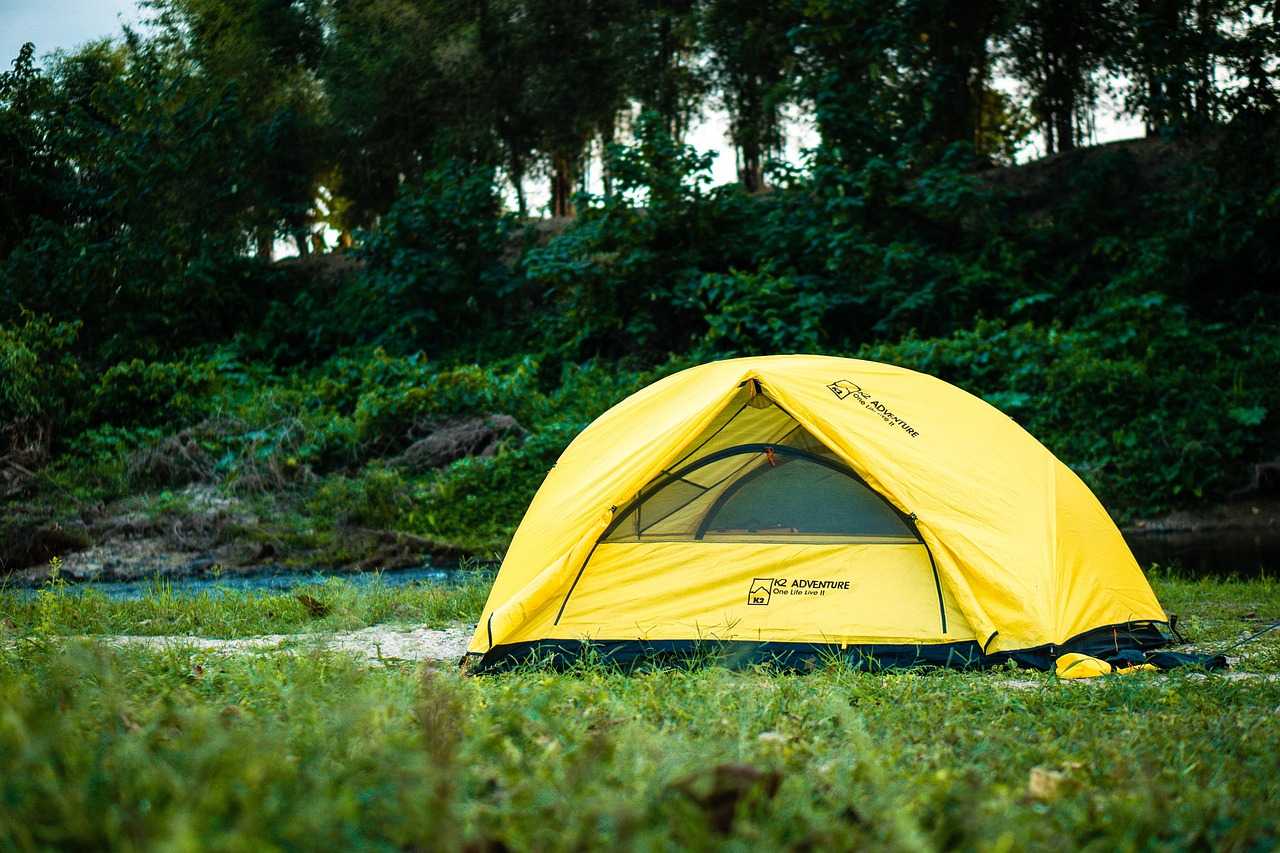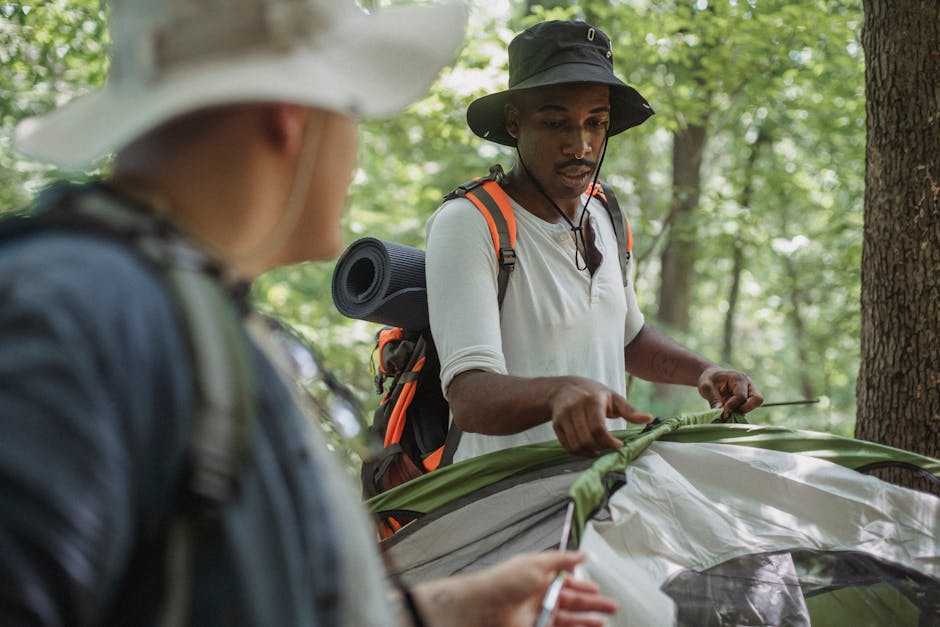Choosing the Wrong Campsite
Selecting a campsite isn’t just about convenience it’s the foundation for a safe, comfortable, and enjoyable outdoor experience. A bad site choice can affect everything from your sleep to your safety. Here’s how to avoid one of the most common rookie mistakes:
Why Location Matters More Than You Think
You may be exhausted after a long hike, but rushing into the first open clearing is a major misstep. The terrain, exposure, and surroundings all influence your experience:
Improper locations can lead to water pooling under your tent
Dangerous overhead hazards like falling branches can pose serious risks
Heavily trafficked areas lead to noise, lack of privacy, and environmental damage
Key Hazards to Avoid
Be deliberate about where you camp. Stay alert to these common red flags:
Low lying ground: prone to pooling water during rain
Widowmakers: dead branches or damaged trees overhead can fall unexpectedly
Busy trails: pitching too close to a trail disrupts nature for others and invites unwanted traffic through your camp
Water Access Without the Risk
It’s tempting to camp right next to a lake or stream, but proximity comes with a price if you’re not careful:
Avoid camping within 200 feet of water sources to reduce environmental impact and potential flooding
Being farther from water reduces mosquito and wildlife encounters
Scout higher ground nearby to maintain water access without compromising safety
Choosing the right campsite is preventative care for your entire trip. A few extra minutes of scouting can save you hours of discomfort or worse.
Ignoring Weather Conditions
Weather isn’t just background noise it’s a leading character in your camping experience. Failing to account for changing conditions can turn a great trip into an uncomfortable or even dangerous one. Here’s how to stay ahead of the skies.
Read the Forecast Like a Backcountry Pro
Before you head out, dig deeper than the average weather app. Look for:
Hourly forecasts to understand how temperature and precipitation will change throughout the day and night
Wind speeds and direction, especially important for exposed campsites
Sunrise and sunset times to plan your setup and breakdown accordingly
Local advisories or alerts, like high wind warnings or cold fronts
Check sources that specialize in outdoor and mountainous regions for more accurate data, especially if heading into backcountry areas.
Set Up with Wind, Rain, and Sun in Mind
Once on site, your awareness of the weather should guide your decisions:
Wind: Position your tent so the narrowest side faces into the wind, and use natural windbreaks like boulders or dense brush when possible.
Rain: Avoid pitching on low ground or depressions that collect water. Angle tarps to drain efficiently, away from sleeping areas.
Sun: Morning sun can help dry your gear, but too much midday exposure might overheat your site. Use shade strategically based on expected temperatures.
Prepare for Sudden Overnight Drops
It’s common for temps to dip sharply after sundown even in summer.
Layer smart: Pack warm layers even if the forecast seems favorable.
Insulate your sleep system: Use sleeping pads with adequate R value and consider a liner for your sleeping bag.
Avoid sweating before bed: Sweat cools quickly dry change of clothes is a must before turning in.
Advanced prep for weather isn’t paranoia it’s what separates seasoned campers from uncomfortable ones.
Skipping a Dry Run of Your Gear
There’s a certain kind of confidence that only comes from setting up your tent in your backyard with a headlamp on. Before you hit the trail, test everything tents, tarps, stoves, and that new camp lantern you swore was fully charged. If something’s busted or missing, you’ll find out when it still matters.
Dry runs expose problems you wouldn’t catch until the wind picks up or the rain starts sliding through that ‘waterproof’ seam. It’s also when you discover missing stakes, mismatched poles, and that your lighter doesn’t like altitude. Better to look a little silly now than to spend your first night in the woods soaked and cold.
No prep means rolling the dice. Testing gear beforehand means fewer surprises and a better shot at actually enjoying camp once you get there.
Poor Tent Placement
This one ruins more trips than bad weather. Let’s talk ground. Setting your tent at the base of a slope might feel sheltered, but once it rains, that cozy dip turns into a cold puddle. Always scout for drainage patterns if water flows through there, skip it. Even a slight incline can send rain seeping under your tent floor overnight.
Then there’s the fire pit mistake. Pitching too close might seem convenient on a chilly night, but it’s flat out dangerous. Sparks jump. Woodsmoke clings. And come morning, you’ll regret the mess.
The gold standard? High, flat, shaded, and protected. A spot with natural cover, minimal wind funneling, and no obvious low spots. Take the extra five minutes to walk the site, kick the ground, and eye the slope. Your dry gear, unburned tent body, and rested body will thank you.
Not Following Campground Etiquette

A peaceful night at camp starts with a little situational awareness. Keep your volume down as the sun sets sound travels far in quiet woods. No one paid good money to hear your Spotify playlist echo off the trees at midnight. Pack headphones, not speakers.
Light pollution’s another killer. String lights and lanterns are fine, but kill the glow when it’s time to sleep. Use red lights when possible they’re less jarring and let others keep their star views. Same goes for smells. That late night chili reheat? It doesn’t just attract critters it makes you the campsite everyone avoids.
Stick to common curfews posted at the site, keep a clean perimeter, and control your trash. If your camp smells like a roadside diner, it’s time to rethink your kitchen setup.
For a full breakdown of dos and don’ts that help everyone camp easier, check out these campground etiquette tips.
Bringing the Wrong Food or Storage
Food attracts company, and not the kind you want. Bears, raccoons, coyotes if they smell it, they’re coming. Anything scented counts as a “smellable” that includes toothpaste, deodorant, even sunscreen. If it smells like anything other than dirt or pine, it needs to be sealed tight and stored properly.
Coolers should be bear rated or locked up in a vehicle. Leaving food out or loosely packed is asking for a nighttime visit. Remember, a curious bear doesn’t just ruin your dinner it may get relocated or put down as a result. That’s on you, not the animal.
Also, avoid the rookie mistake of overpacking gourmet backwoods meals. You don’t need three courses. Bring what you’ll actually eat. Keep it simple, calorie dense, and lightweight. A solid camp menu doesn’t just feed the body it keeps your pack manageable, your setup quicker, and your risk lower.
Forgetting Fire Safety Basics
Fire is useful until it isn’t. One bad spark can turn into a serious problem fast, and it won’t stop at just your stove or gear. Wildfires don’t care if you meant well. If you don’t want your name on a news headline, pay attention.
Start with smart placement. Keep fires far enough from tents, trees, and anything flammable think about wind direction, overhead branches, and dry brush nearby. Always clear a safe zone: bare dirt or rocks, nothing that can catch. And never light up without a full water source ready at hand. A bucket. A water bottle. Anything that lets you douse a flare up without delay.
Also: know the rules. Burn bans aren’t suggestions. Check local fire restrictions before you strike a match, especially in high risk areas or dry seasons. Rangers patrol, and fines are steep but more importantly, mistakes can cost wilderness areas, homes, or lives.
Bottom line: if you’re going to make fire part of your camp, don’t wing it. Set it up right. Stay alert. And when in doubt, skip the flame altogether.
Overpacking or Underpreparing
Carrying all your gear on your back makes you rethink what you really need. That third flashlight? Dead weight. A French press the size of your head? Leave it at home. Every extra pound slows you down and drains your energy before you even finish setting up camp. Bring what matters, skip what doesn’t.
The key isn’t high end gear; it’s having a system. A well tested checklist is worth more than an ultralight titanium spoon. Start with the basics: shelter, food, clothing, water, safety. Then cut ruthlessly. If you haven’t used it on your last two trips, odds are you won’t use it now.
Your brain will fail you after a five hour hike. Memory doesn’t care if you forget your camp stove or headlamp. Systems do. Rely on them. Check your gear off ahead of time, get organized, and you’ll spend more time enjoying the outdoors and less time cursing under your breath in the dark.
Mismanaging Waste
Leave No Trace isn’t a suggestion it’s the baseline. Every wrapper, every bit of food, every shred of packaging needs to go with you. Micro trash those torn corners of energy bar wrappers, pieces of toilet paper, and twist ties adds up fast and causes real harm. If you bring it in, pack it out. No exceptions.
When nature calls, don’t wing it. Use designated bathroom facilities where available. If you’re off grid, learn the rules of proper digging: 6 8 inches deep, at least 200 feet from water sources, trails, and campsites. And yes, bring a trowel it’s worth the weight. Using natural cat holes badly or skipping them entirely can pollute land and water for anyone coming after you.
Respecting the land keeps it open, clean, and wild. Don’t be the reason rangers have to clamp down on access.
Failing to Respect Wildlife and Other Campers
Feeding wildlife might feel harmless or even endearing in the moment. But it’s a quick shortcut to long term problems. Animals that start associating humans with food become aggressive, dependent, and dangerous. You’re not just risking your safety you’re ruining it for others and shortening the life of animals that lose their natural instincts. Keep your snacks to yourself.
On the human side, remember that campgrounds aren’t your private backyard. Sound carries in open air. Your Bluetooth speaker, your midnight laughter, even your headlamp glare they all leave a mark. Practice sensory discipline. Ditch the noise, dim the lights, and don’t crowd others’ space.
Camping is a shared experience. Keep it clean, quiet, and wild. For more on how to be a better neighbor in nature, revisit these essential campground etiquette tips.


 Eugenia Phillips plays a pivotal role in the development of Terra Tactician Tactics, bringing her expertise and enthusiasm for the outdoors to the platform. With a strong background in environmental studies and a passion for adventure, Eugenia is dedicated to crafting content that resonates with both novice and seasoned outdoor enthusiasts. She focuses on creating comprehensive guides and articles that offer practical tips, safety advice, and innovative ideas for those looking to explore nature responsibly and confidently. Her attention to detail and commitment to delivering valuable information have made her an invaluable asset to the project.
Eugenia's contributions extend beyond content creation; she is deeply involved in shaping the platform's mission to foster a community of like-minded adventurers. Her collaborative spirit and love for the outdoors drive her to constantly seek new ways to enhance the site's offerings. Whether she is sharing her experiences from a recent hike or conducting research on the latest survival gear, Eugenia's work is infused with a genuine desire to help others enjoy and appreciate the natural world. Her passion for the project is evident in every article she writes, making her a cornerstone of the Terra Tactician Tactics team.
Eugenia Phillips plays a pivotal role in the development of Terra Tactician Tactics, bringing her expertise and enthusiasm for the outdoors to the platform. With a strong background in environmental studies and a passion for adventure, Eugenia is dedicated to crafting content that resonates with both novice and seasoned outdoor enthusiasts. She focuses on creating comprehensive guides and articles that offer practical tips, safety advice, and innovative ideas for those looking to explore nature responsibly and confidently. Her attention to detail and commitment to delivering valuable information have made her an invaluable asset to the project.
Eugenia's contributions extend beyond content creation; she is deeply involved in shaping the platform's mission to foster a community of like-minded adventurers. Her collaborative spirit and love for the outdoors drive her to constantly seek new ways to enhance the site's offerings. Whether she is sharing her experiences from a recent hike or conducting research on the latest survival gear, Eugenia's work is infused with a genuine desire to help others enjoy and appreciate the natural world. Her passion for the project is evident in every article she writes, making her a cornerstone of the Terra Tactician Tactics team.